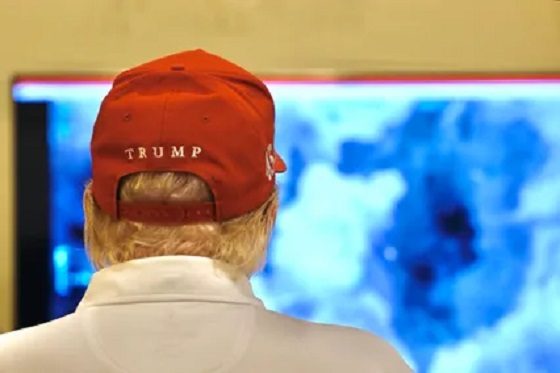conflict
Ukraine And Russia Scramble To Make Territorial Gains In Anticipation That Trump Will Push For Peace Deal

 From the Daily Caller News Foundation
From the Daily Caller News Foundation
Ukraine and Russia are both vying to make territorial gains ahead of President-elect Donald Trump’s inauguration and his expected push for a peace deal.
Trump has said on multiple occasions that he would bring a swift end to the war, relying on his relationships with both Ukrainian President Volodymyr Zelenskyy and Russian President Vladimir Putin and his ability to negotiate with both. In anticipation that Trump will broker a peace settlement in short order, both Russia and Ukraine are making potential last-ditch efforts to grab territory for the other that they could possibly use as leverage during negotiations, according to The Wall Street Journal.
“They’re assaulting all the time—morning, day, night,” a Ukrainian battalion commander told the WSJ.
One current flashpoint is the Kursk region of Russia, which Ukrainian forces seized part of during an invasion over the summer. Russian forces are desperately vying to take back the territory, according to the WSJ. Moscow has deployed roughly 45,000 troops to the region, and in recent weeks has taken back half of it. North Korea has additionally deployed 10,000 troops to Kursk to aid Russian forces.
Meanwhile, Ukraine has been making use of U.S.-provided long-range missiles to strike targets deep inside Russia, the first time Ukraine has been allowed to do so after two years of war. President Joe Biden’s decision to let Ukraine use the missiles puzzled some national security experts, given the national security risks.
There’s some concern in Kyiv that Trump will approach U.S. support for Ukraine differently than Biden has, and that Trump’s bid to end the war could end up benefiting Russia, according to the WSJ. Ukraine believes Russia wants to retake Kursk before Trump is inaugurated.
“It’s the best Ukrainian forces against the best Russian forces,” a Ukrainian sergeant fighting in Kursk told the WSJ. “At this rate, I see no reason for us to withdraw.”
Russia is losing roughly 1,000 men a day in the fight to retake Kursk, some Ukrainian troops told the WSJ. Russia has lost an estimated 700,000 fighters total since the war began.
Ukraine is betting that if it can hold onto Kursk, it can use the region as leverage in future ceasefire negotiations with Russia, according to the WSJ.
“The Ukrainian strategy there is to hold on to it as a bargaining chip and obtain a favorable attrition ratio vis-à-vis the Russians,” Vienna-based military analyst Franz-Stefan Gady told the WSJ. While it would be difficult for Ukraine to hold on to Kursk, Gady said, “I think the Russians will have a tough fight.”
But the sentiment among some Ukrainian soldiers is wavering, with some feeling anger or confusion toward the Kursk operation and whether it was worth the cost, according to the WSJ. And Moscow hasn’t stopped throwing men toward the frontlines. Ukraine has suffered from a lack of manpower since the war began, and fighters don’t have access to the same military or communication equipment that Russia does.
“I think they’ll eventually push us back,” the Ukrainian battalion commander told the WSJ. “They add more power and more resources, and they have a goal to reach the border at any cost, so they will do it.”
conflict
Zelensky Alleges Chinese Nationals Fighting for Russia, Calls for Global Response

 Sam Cooper
Sam Cooper
Ukrainian President Volodymyr Zelensky announced Tuesday that his forces have captured two Chinese citizens fighting as part of the Russian army in eastern Ukraine, alleging “there are many more Chinese citizens in the occupier’s units.” The stunning revelation could inject a volatile new dimension into ceasefire negotiations between the United States and Russia—and intensify already fraught tensions over Taiwan.
Zelensky shared the news in an X post, accompanied by video of one of the captured men—an Asian male in beige fatigues, hands bound with zip ties, visibly distressed as he gestures to a Ukrainian camera operator. The video shows the man making whirring sounds, crouching instinctively as if a drone is circling above and opening fire—then glancing up and uttering the English word, “commander.”
“We have information suggesting that there are many more Chinese citizens in the occupier’s units than just these two,” Zelensky wrote on X. “We are currently verifying all the facts—intelligence, the Security Service of Ukraine, and the relevant units of the Armed Forces are working on it.”
The president said he has instructed Ukraine’s foreign minister to urgently contact Beijing to clarify how China intends to respond.
“Russia’s involvement of China, along with other countries, whether directly or indirectly, in this war in Europe is a clear signal that Putin intends to do anything but end the war,” Zelensky wrote. “He is looking for ways to continue fighting. This definitely requires a response. A response from the United States, Europe, and all those around the world who want peace.”
Zelensky added that Ukrainian authorities had recovered documents, bank cards, and personal data from the two prisoners—material that could be pivotal in discovering the nature of China’s involvement.
If verified, the presence of Chinese nationals fighting for Russia could carry sweeping geopolitical implications. It would complicate delicate U.S.-Russia negotiations aimed at exploring a conditional ceasefire, and could have indirect ramifications on the plans of Washington, Tokyo, and Taipei in their growing confrontation with Beijing.
China has repeatedly denied providing direct military support to Russia. Zelensky’s statement marks the first time Ukraine has publicly alleged that Chinese nationals are embedded in Russian combat units—an allegation that, if substantiated, could alter the strategic calculus in both Eastern Europe and the Indo-Pacific.
Responding to Zelensky’s claims, Tom Shugart, a senior defense analyst at the Center for a New American Security and a former U.S. Navy officer, emphasized that the strategic implications hinge on whether the Chinese nationals were acting as mercenaries or state-directed personnel. “If the PRC is actively providing soldiers to fight in Ukraine, that would be altogether different—a possible sign of a real Axis that may best be resisted wherever it is fighting,” he wrote on X.
This is a developing story. The Bureau will continue to report as further details emerge.

Recommend The Bureau to your readers
conflict
“HELL WILL RAIN DOWN”: Trump unleashes U.S. military on Yemeni Houthis

 MxM News
MxM News
Quick Hit:
President Trump ordered a massive military assault on Iranian-backed Houthi forces in Yemen on Saturday, vowing to unleash “overwhelming lethal force” after months of attacks on American and allied vessels in the Red Sea.
Key Details:
-
Trump announced the strikes in a Truth Social post, stating, “Today, I have ordered the United States Military to launch decisive and powerful Military action against the Houthi terrorists in Yemen.”
-
He criticized former President Joe Biden for failing to contain the Houthis, saying his response was “pathetically weak” and emboldened the group’s ongoing attacks on commercial and military vessels.
-
The U.S. Navy’s USS Harry S. Truman carrier strike group, along with three destroyers and a cruiser, launched the assault, targeting radars, air defenses, and missile systems used to disrupt shipping lanes.
CENTCOM Forces Launch Large Scale Operation Against Iran-Backed Houthis in Yemen
On March 15, U.S. Central Command initiated a series of operations consisting of precision strikes against Iran-backed Houthi targets across Yemen to defend American interests, deter enemies, and… pic.twitter.com/u5yx8WneoG
— U.S. Central Command (@CENTCOM) March 15, 2025
Diving Deeper:
President Trump escalated U.S. military action against Iran-backed Houthi rebels on Saturday, ordering airstrikes on targets in Yemen in response to the group’s repeated attacks on Red Sea shipping. Trump, in a Truth Social post, declared that the U.S. military would not tolerate continued aggression and vowed an overwhelming response.
“The Houthi attack on American vessels will not be tolerated,” Trump wrote. “We will use overwhelming lethal force until we have achieved our objective.” He directly warned the Houthis, stating, “YOUR TIME IS UP, AND YOUR ATTACKS MUST STOP, STARTING TODAY. IF THEY DON’T, HELL WILL RAIN DOWN UPON YOU LIKE NOTHING YOU HAVE EVER SEEN BEFORE!”
The strikes, carried out by U.S. Central Command, targeted missile sites, drone launch facilities, and command centers used by the Houthis to strike commercial and military vessels in the Red Sea. U.S. warships and carrier-based fighter jets participated in the mission, marking a significant escalation in efforts to protect international shipping routes.
Trump also issued a direct warning to Iran, demanding that its support for the Houthis “must end immediately.” Addressing Tehran, Trump wrote, “Do NOT threaten the American People, their President…or Worldwide shipping lanes. If you do, BEWARE, because America will hold you fully accountable and we won’t be nice about it!”
The strikes come after more than a year of escalating attacks by the Houthis, who have targeted over 100 merchant vessels, sunk at least two, and killed multiple sailors since the Israel-Hamas war began. Trump pointed to Biden’s failures in handling the crisis, noting that “it has been over a year since a U.S.-flagged commercial ship safely sailed through the Suez Canal, the Red Sea, or the Gulf of Aden.”
With Trump’s order, the U.S. is making clear that hostile actions in the Red Sea will not go unanswered. As military operations continue, all eyes will be on whether the Houthis and their Iranian backers heed the warning—or face even greater firepower from the U.S. military.
-

 2025 Federal Election20 hours ago
2025 Federal Election20 hours agoBREAKING: THE FEDERAL BRIEF THAT SHOULD SINK CARNEY
-

 2025 Federal Election20 hours ago
2025 Federal Election20 hours agoCHINESE ELECTION THREAT WARNING: Conservative Candidate Joe Tay Paused Public Campaign
-

 2025 Federal Election1 day ago
2025 Federal Election1 day agoOttawa Confirms China interfering with 2025 federal election: Beijing Seeks to Block Joe Tay’s Election
-

 2025 Federal Election1 day ago
2025 Federal Election1 day agoReal Homes vs. Modular Shoeboxes: The Housing Battle Between Poilievre and Carney
-

 2025 Federal Election2 days ago
2025 Federal Election2 days agoCarney’s budget means more debt than Trudeau’s
-

 International2 days ago
International2 days agoPope Francis has died aged 88
-

 Business9 hours ago
Business9 hours agoHudson’s Bay Bid Raises Red Flags Over Foreign Influence
-

 Business2 days ago
Business2 days agoCanada Urgently Needs A Watchdog For Government Waste


